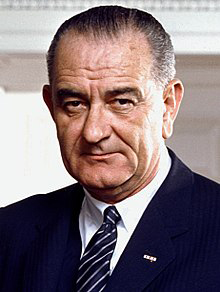LBJ Inaugural Invisitation - 1965 dated Americana
Inv# AM2230Inaugural Committee invitation to inaugural of LBJ in original envelope. Pristine!

Lyndon Baines Johnson (/?l?nd?n ?be?nz/; August 27, 1908 – January 22, 1973), often referred to by his initials LBJ, was an American politician who served as the 36th president of the United States from 1963 to 1969. He became president after the assassination of John F. Kennedy, under whom he had served as the 37th vice president from 1961 to 1963. A Democrat from Texas, Johnson also served as a U.S. representative and U.S. senator. Born in Stonewall, Texas, Johnson worked as a high school teacher and a congressional aide before winning election to the U.S. House of Representatives in 1937. In 1948, he was controversially declared winner in the Democratic Party's primary for the 1948 Senate election in Texas and won the general election. He became Senate majority whip in 1951, Senate Democratic leader in 1953 and majority leader in 1954. In 1960, Johnson ran for the Democratic presidential nomination. Ultimately, Senator Kennedy bested Johnson and his other rivals for the nomination before surprising many by offering to make Johnson his vice presidential running mate. The Kennedy–Johnson ticket won the general election. Vice President Johnson assumed the presidency in 1963, after President Kennedy was assassinated. The following year, Johnson was elected to the presidency in a landslide, winning the largest share of the popular vote for the Democratic Party in history, and the highest for any candidate since the advent of widespread popular elections in the 1820s. Johnson's Great Society was aimed at expanding civil rights, public broadcasting, access to health care, aid to education and the arts, urban and rural development, and public services. He sought to create better living conditions for low-income Americans by spearheading the war on poverty. As part of these efforts, Johnson signed the Social Security Amendments of 1965, which resulted in the creation of Medicare and Medicaid. Johnson made the Apollo program a national priority; enacted the Higher Education Act of 1965, which established federally insured student loans; and signed the Immigration and Nationality Act of 1965, which laid the groundwork for U.S. immigration policy today. Johnson's stance on civil rights put him at odds with other white, Southern Democrats. His civil rights legacy was shaped by the Civil Rights Act of 1964, the Voting Rights Act of 1965, and the Civil Rights Act of 1968. Johnson's foreign policy prioritized containment of communism, including in the ongoing Vietnam War. He launched a full-scale military intervention in Southeast Asia, dramatically increasing the number of American military personnel deployed; casualties soared among U.S. soldiers and Vietnamese civilians. In 1968, the communist Tet Offensive inflamed the anti-war movement and public opinion turned against the United States's involvement in the war. In Europe, Johnson maintained the postwar policies of his predecessors, by continuing to promote and foster political integration and economic cooperation among Western European nations. During his presidency, the American political landscape transformed significantly, as white Southerners who were once staunch Democrats began moving to the Republican Party and Black voters who sporadically supported the Democrats prior to 1964 began shifting towards the party in historic numbers. Due to his domestic agenda, Johnson's presidency marked the peak of modern American liberalism in the 20th century. Johnson faced further troubles with race riots in major cities and increasing crime. His political opponents seized the opportunity and raised demands for "law and order" policies. Johnson began his presidency with near-universal support, but his approval declined throughout his presidency as the public became frustrated with both the Vietnam War and domestic unrest. Johnson initially sought to run for re-election; however, following disappointing results in the New Hampshire primary he withdrew his candidacy. Johnson returned to his Texas ranch, where he died in 1973.











Ebay ID: labarre_galleries